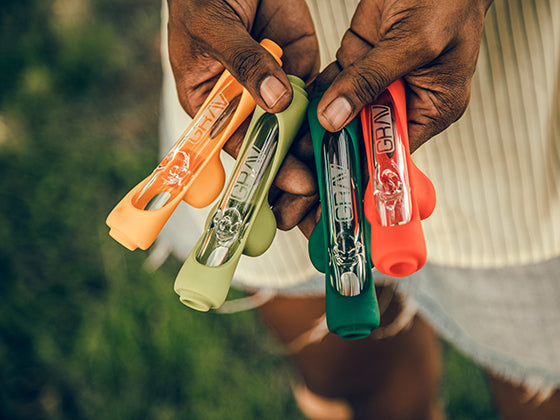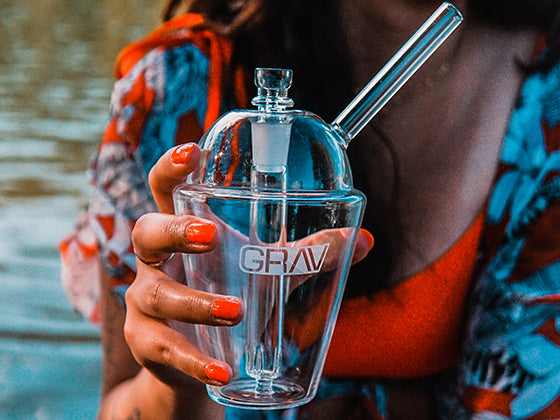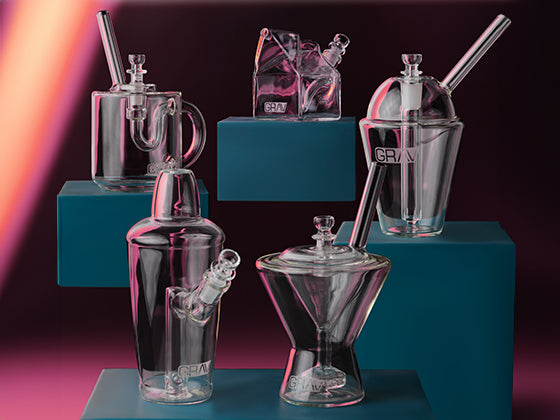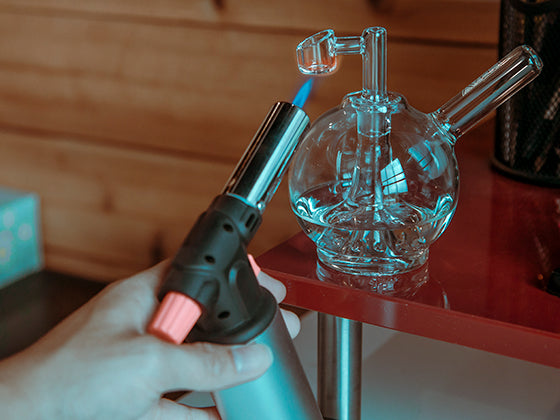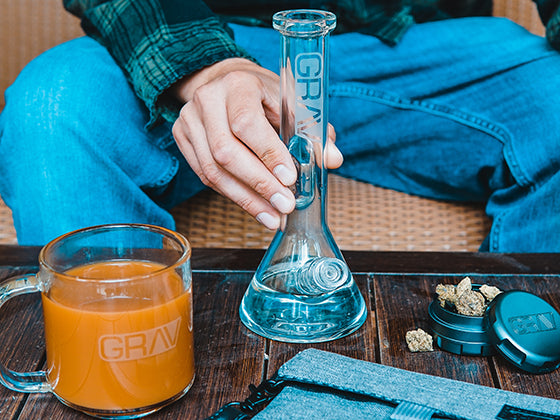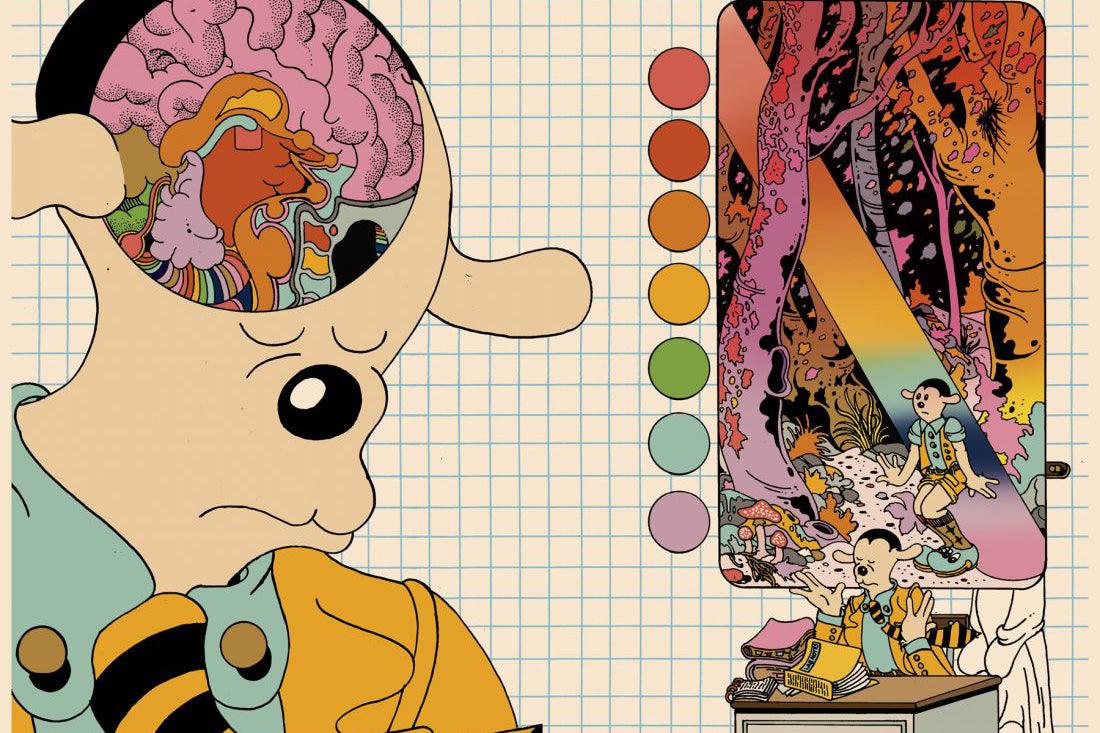Terroir. Appellations. Typicity.
Unless you’re a sommelier, these terms may be completely foreign to you.
Max Montrose is not a sommelier. But this terminology, more common in the world of wine, has a place in his work as well.
Max is a cannabis expert and co-founder of The Trichome Institute, a cannabis education platform that provides scientific and fact-based (but fun!) courses all about cannabis.

Why do we love Max?
Because Max is to cannabis education what we are to cannabis products — science-based (and awesome.) He’s forgotten more about the plant than most of us will ever even learn.
Plus, he’s an old friend of GRAV. He taught one of his excellent interpening courses at our offices last year. We’ve provided him with fresh glass to use when judging cannabis cups. And he uses our limited edition Menorah — a gift from GRAV founder David Daily — as a part of his annual Hanukkah tradition.
So you could say he’s a part of the GRAV extended family. Our cannabis cousin, if you will.
Max was kind enough to chat with me about his activism, The Trichome Institute, and the future of cannabis education.
Activist Roots
Max first started experimenting with cannabis in middle school. “I explored it because I was told not to at a very young age,” he says. “I stumbled upon which types were helping me medically, which is what started the foundation of interpening.”
“Interpening” is a term coined by Max. It refers to evaluating cannabis to anticipate psychotropic effects through a thorough inspection of the plant. Like a sommelier, an interpener will develop their palate to help them accurately identify a plant’s origins, quality, and place on the spectrum “from sedative to stimulating.”
But before all that, he was a high school student, exploring cannabis and trying to understand why this incredible plant was against the law. Max started working alongside activists in his hometown of Denver, pushing for recreational marijuana. One of those groups was the legal team at cannabis law firm Vicente Sederbert LLP, who went on to write Amendment 64 legalizing recreational cannabis in Colorado.

“Grow Book” Education
Although Max has been a lifelong cannabis user for both health and recreational purposes, he is not overly enthused about the way cannabis has been sold to consumers since it’s achieved its patchwork legal status.
“I was working in the dispensaries as a budtender in 2009, before cannabis was regulated, before there was such a thing as ‘medical’ or ‘retail.’ I was just really frustrated, as a legitimate medical patient myself who uses cannabis for a variety of reasons, that we weren’t providing information to patients on purpose. The idea was to sell them a bag of weed and get them out of the store and move onto the next person.
“But beyond that, budtenders don’t know how and why edibles are chemically a different drug than all other forms of cannabis ingestion. People don’t know how you can medicate a child with cannabis in a way that’s not intoxicating. It’s unacceptable that you have to be trained, licensed, and certified to paint fingernails and cut hair, but not to pretend to be a pharmacist and work with actual medical patients one-on-one.”
Why are we so ill-informed about the science of cannabis? Blame the government. As a Schedule 1 drug, marijuana (along with heroin) is defined as a “[drug] with no currently accepted medical use [emphasis added] and a high potential for abuse.”
This bizarre classification is consistently upheld due to insufficient scientific evidence proving its medical efficacy. And the lack of evidence is, itself, due to the Schedule 1 designation. There is only one approved grower for research marijuana — the University of Mississippi. And applications to perform studies must first be approved by both the FDA and DEA.
It’s worth noting that the DEA is taking steps toward resolving these issues. Just last month (March, 2020) the agency proposed a rule change that would allow for additional growers of research marijuana. But until researchers can complete further large-scale trials, education is sparse.
“The only information in the past 50 to 60 years,” Max says, “is from grow books written by black market horticulturists — not scientists or experts.”

The Trichome Institute
Tired of the lack of science-backed education in cannabis, Max took matters into his own hands, co-founding The Trichome Institute in 2014. The group’s goal is to provide standardized, certified education for growers, budtenders, medical users, recreational users, and anyone else who is curious about cannabis.
Current online courses include:
Cannabis for All, intended to teach cannabis consumers the basics and then some, without getting overly technical;Cannabis Consultant Training for cannabis professionals, so they can further educate their customers; and
Professional Interpening for the cannabis “sommelier.” This course dives into 500 years of cannabis history, plant anatomy, aroma profiles, and how to predict the psychotropic effects of different flowers.
And there are several projects on deck, including an Extract & Concentrate course that’s due to launch soon. They’ll also be offering their online Interpening course in Spanish. And most exciting is their new Advanced Interpening course, meant to continue the education of certified Level 1, Level 2, or Professional Interpeners. This in-person 10 hour workshop will provide hands-on training and testing in the identification of psychotropic effects of cannabis flowers.
The Future of Cannabis Education
More education resources are coming. Although some states require some education, it varies widely from place to place. And training is more focused on complying with state and local regulations (which change all the time) rather than the product itself. The Colorado Department of Public Health and Environment (CDPHE) and the Marijuana Enforcement Division (MED), for example, have certified several Responsible Vendor Programs (including one by The Trichome Institute) — but it’s not mandatory.
But Max thinks that will change soon.
“It’s impossible to imagine that nationwide, you’re going to have sales in the billions of dollars, selling psychotropic drugs to sick people by 20-year-olds who don’t know what cannabinoids are. That shit’s gonna end real fast.”
In addition to being a good idea for health reasons, better education just makes financial sense. Right now, industry professionals are bogged down in the minutiae of a new and complicated industry. But when they look around and consider that their multi-billion dollar industry is in the hands of untrained budtenders, the education will follow.
“It increases sales and decreases risks when they are trained and certified and know what they’re doing,” Max says.
The Legalization Question
Nationwide legalization is often considered an inevitability. Even in Texas, a 2019 poll showed that 38% of people are in favor of full legalization, and another 35% would support medical marijuana.
Once people can get over their own biases, there are no reasons not to support legalization.
“Colorado has an additional $100 million in revenue from cannabis tax sales alone. You don’t want that because you think this stuff does what to people? And where is that information coming from? And how old is it? It’s time for a revolution now, people, and it all starts with education.”
And the benefits go beyond the financial. “Everywhere that legalizes cannabis sees a decrease in hospitalizations from pharmaceutical and other drug overdoses, reduced drunk driving, violence, and domestic abuse...Look at police reports in the timeline of when a location legalizes marijuana. Watch crime go down and revenue and jobs go up overnight, simultaneously.”
A Flower Guy
As you can probably imagine, a man who has dedicated his life to marijuana advocacy and education is a pretty regular user. He’s a flower guy, and rarely dabbles in concentrates.
When I asked him what his favorite piece is, Max said, “I generally only smoke out of GRAV glass*, and that’s because GRAV has sponsored me for years and years.” His preferred pieces are small-diameter bongs with short stems and thick, heavy glass — unless it’s Hanukkah. Then it’s all about the Menorah.
To keep up with The Trichome Institute, follow them on Instagram, Facebook, and YouTube. And check out Spliff Busters, a video show starring Max where Max talks all things cannabis.
*I promise I didn’t pay him to say that.
Quotes have been lightly edited for readability.
1. https://trichomeinstitute.com/interpening
2. https://www.dea.gov/drug-scheduling
3. https://www.drugabuse.gov/drugs-abuse/marijuana/nidas-role-in-providing-marijuana-research



